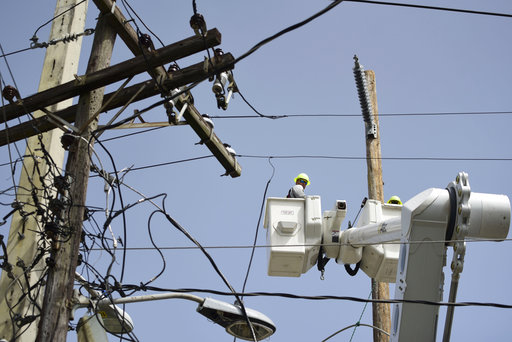Power contract cancelled: What’s next for Puerto Rico?

In this Thursday, Oct. 19, 2017 photo, a brigade from the Electric Power Authority repairs distribution lines damaged by Hurricane Maria in the Cantera community of San Juan, Puerto Rico. The storm struck after the Authority had filed for bankruptcy in July, put off maintenance and had finished dealing with outages from Hurricane Irma. (AP Photo/Carlos Giusti)
After Hurricane Maria devastated Puerto Rico, the island was left in an urgent state of emergency that the United States lagged in responding to. Now, over a month later, citizens are still suffering from the horrific aftermath of the storm.
Nearly six weeks after Hurricane Maria hit, the majority, at an outstanding 70%, are without power in Puerto Rico. As a result, businesses and stores have been shut down sending the local economy into turmoil, and more pressingly, an unknown number of lives have been lost, a number that is continuing to grow.
The most recent development in the restoration of power is the cancelled power contract signed with the Montana company Whitefish Energy Holdings. Gov. Ricardo A. Rosselló announced Sunday that he canceled the contract that would have repaired the area’s electrical grid. Prior to the announcement, controversy had been stirring over the contract. Ultimately, the Puerto Rico Electric Power Authority (PREPA) decided to cancel the $300 million contract after concern was expressed over how Whitefish won its contract and how well equipped the company was to handle the task of rebuilding the area’s electrical grid.
Controversy arose over several components of the energy company including the fact that it has several prominent connections and ties to the Trump administration. Whitefish is located in the hometown of Interior Secretary Ryan Zinke, and the head of the private equity firm it’s backed by is Joe Colonnetta, a major donor to President Trump’s election campaign.
Members of Congress and the Federal Emergency Management Agency (FEMA) are two groups that have explicitly voiced their concerns. Members of Congress expressed their concern over how the contract for the major, monumental project of rebuilding Puerto Rico’s electrical grid was given to a small, unknown Montana company. In addition, the Federal Emergency Management Agency has expressed concern over whether the amount of the contract awarded was reasonable. FEMA issued a statement harshly criticizing the contract, even stating that they might refuse to cover the contract’s costs if it was found improper.
Gov. Ricardo A. Rosselló said the controversy surrounding the contract was taking away from the focus of restoring power on the island.
In response, a statement was released from the Whitefish company defending its work on the island: “We are very proud of our contributions to the island’s recovery and proud of the tremendous work that our team has done under very challenging conditions.”
According to the Wall Street Journal, who cited anonymous sources, the FBI has opened an inquiry into the contract between Whitefish Energy Holdings and PREPA. However, as of currently, the investigation has not been confirmed. Carlos Osorio, a spokesman for the FBI national office, said the agency could not confirm or deny the existence of an investigation. Whitefish Energy’s spokesman Ken Luce said that the company has not been contacted by the FBI. In a statement to CNN, he said, “While Whitefish is not aware of any such investigation, Whitefish is committed to full cooperation with any inquiry or investigation.”
The United States’s response to the damage inflicted in Puerto Rico has been criticized by UN experts who view the recovery attempts made in Puerto Rico as ineffective and delayed, especially when compared to the response to the damage of storms on the U.S.’s mainland such as Harvey in Texas along with Irma in Florida. Conditions in Puerto Rico are still at an alarming state with thousands homeless, the majority powerless, contaminated water supplies, nonfunctional hospitals, and other signs of chaos and devastation with seemingly no relief or hope in sight. Looking forward, it’s crucial that the U.S. government make Puerto Rico their top priority and focus all their efforts in helping the island to recover.

